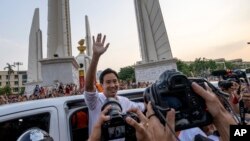A victory by liberal, youth leaning political parties in Sunday’s Thai national elections could have wider ramifications for Southeast Asia on issues ranging from human rights to the crisis in Myanmar.
However, analysts stressed a potential alliance between Move Forward – with its leader Pita Limjaroenrat as prime minister – and the Pheu Thai Party still had to overcome a military-backed senate, which was instituted after the 2014 coup put Thai General Prayut Chan-o-cha in power.
According to election results, Move Forward exceeded forecasts, winning 151 of the 500 seats contested in the lower house. Pheu Thai, led by Paetongtarn Shinawatra, daughter of former prime minister Thaksin Shinawatra, held 141 seats.
Prayut’s United Thai Nation Party held just 15 percent of the seats.
“I think it shows that the people of Thailand really have woken up and they really want a fundamental change in the way the country is organized, they want a democratic government,” said Charles Santiago, from the ASEAN Parliamentarians for Human Rights (APHR).
'Major awakening moment'
He noted that APHR enjoys strong ties with Move Forward and its solid stance on human rights will add a much-needed boost to talks aimed at ending the carnage in Myanmar and send a stern message to authoritarian regimes that now dominate in mainland Southeast Asia.
“This is very good, a major awakening moment for Southeast Asia,” he said, adding that Phnom Penh, in particular, should take note of the emerging youth vote given Cambodians will go to the polls in July, in an election without any major political opposition.
“If the Move Forward party becomes the leader of the government, then the relationship with Myanmar will change, the positions of ASEAN too will change and I think you will see a faster resolution to the problem in Myanmar as opposed to the stalemate,” he said.
A split has emerged within the 10 nations of the Association of Southeast Asian Nations (ASEAN) between mainland authoritarian states – Myanmar, Thailand, Cambodia, Laos and Vietnam – which are predominantly Buddhist and lean towards China, and maritime members of the bloc.
Maritime states are mainly Islamic or Christian, largely democratic and include Indonesia, Malaysia, and the Philippines. Singapore and Brunei. They are wary of China’s rapid expansion in the region and its claims over disputed waters on the high seas.
Indonesia and Malaysia have also pushed for a much stronger stance against the junta in Myanmar, since it seized power through a coup in February 2021. Under Prayut, Thailand has been accused of maintaining close ties with the generals in Naypyidaw.
Bradley Murg, a distinguished senior research fellow with the Cambodian Institute for Cooperation and Peace said if Move Forward wins the support of the military-backed Thai senate, which holds the right to choose prime ministers, then some change was in the offing.
“Should they get into power, it would be a first step in changing the perception that mainland Southeast Asia has drifted inexorably into authoritarianism and the mainland-maritime divide in ASEAN will need to be somewhat reconsidered,” he said.
Thailand - U.S. relationship
He added Thailand’s broader foreign policy with the United States would not change although a Move Forward-Pheu Thai alliance could challenge existing telecom policies that have delivered Chinese firms, including Huawei, lucrative contracts.
“An opposition win will fundamentally not alter U.S.-Thai relations,” Murg said. “But expect an uptick in cooperation on issues like human rights and Chinese telecoms.”
Bangkok-based Don Greenlees, a senior advisor to AsiaLink at the University of Melbourne, said significant differences between the political parties and the military still needed to be resolved and it was too early to say whether aspects of Thai foreign policy will change.
“It’s possible they could take a stronger line on certain human rights issues within the region but in general their attempts to retain their autonomy as much as possible from the great power rivalry will continue to be a feature of their foreign policy,” he said.
Other analysts also said autonomy and not being seen as too close to either the U.S. or China would remain “as a bedrock of Thai foreign policy that would not change.”
Migrant workers
Human rights, however, is another issue. One observer, with experience in the trade union movement, said the election results could also spell some change for the better for migrant workers in Thailand.
“Thailand is a major source country for migrant workers. One would hope they will address the issues they face and make it fairer for workers, that will help send a signal for other countries in the region,” said the observer, who wished to remain anonymous, given past tensions between trade unions and the government.
On Sunday night, Prayut told journalists that he respected the results and would continue to perform his duty “to the best of my ability in whatever capacity. Adding that “I will continue to serve the nation, religion and the monarchy for the rest of my life.”
“I have respect for the democratic process and the election results,” he said.
But Gavin Greenwood, an analyst with Hong Kong-based security consultancy A2 Global Risk, echoed Santiago and Murg saying it was difficult to believe that the Thai military, conservative ruling elites and the Royal Palace would simply accept the results.
“If the parties which threaten or are perceived to threaten the interests of the military or the establishment or the palace, win – I will be impressed,” he said. “It will be quite astonishing if a military coup is overturned by a democratic vote.”






